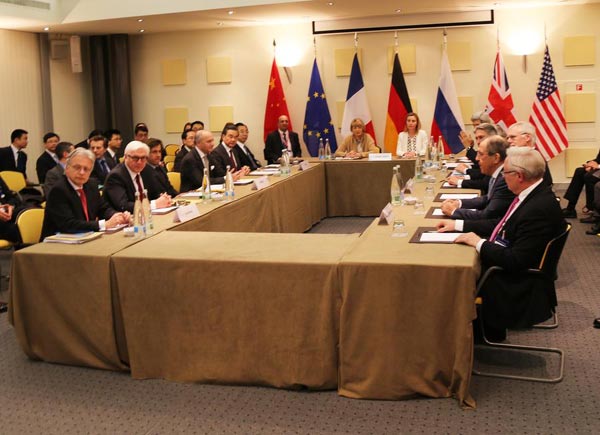 |
|
The general view of the plenary session on Iran's potential nuclear framework deal in Lausanne, Switzerland, on March 29, 2015. Foreign ministers from major world powers on Sunday night kicked off a plenary session to further bridge gaps on Iran's potential nuclear framework deal. [Photo/Xinhua] |
The signing of a framework deal between Iran and 5+1 nations on Friday is the closest the world has come to resolving the Iranian nuclear issue, which should give the parties involved more than enough reason to negotiate the final technical details before a June 30 deadline.
The historic deal was reached at Lausanne, Switzerland, on April 2 after the two sides agreed in principle to resolve the issue following eight days of marathon talks. Between now and June 30 lies sheer hard work for Iran on one side, and the five permanent UN Security Council members plus Germany.
The job will not be easy because Iran and the United States already have their own interpretations on what they agreed to at Lausanne. Teheran insists that the framework deal is non-binding on the signatory parties as it only offers a way to a comprehensive accord. But the US State Department interpretation would have one believe that Iran has made substantial commitments to the international community.
Apparently, Iranian President Hassan Rouhani and his US counterpart Barack Obama both face huge pressure from skeptics and opponents in their own countries to prove that they have not made undue compromises. Although Rouhani seeks to free Iran of the multilateral economic sanctions so that the Iranian economy can improve, he cannot underestimate the influence of conservative forces at home. Consequently, there might be little room for the Iranian government to make any more concession at the negotiations to strike a comprehensive deal.
For Obama, the task of holding up the interim agreement with Iran and ushering in a final agreement looks more challenging. His drive to sell the deal to a hostile US Congress is widely seen as one of the toughest sells of his presidency. On April 6, Republican US Senate majority leader Mitch McConnell criticized the landmark deal and reiterated his pledge to examine legislation proposed by senators Bob Corker (Republican) and Bob Menendez (Democrat). An AFP report says the Corker-Menendez bill would oblige Obama to give lawmakers 60 days to examine, and possibly block, a nuclear deal with Iran.